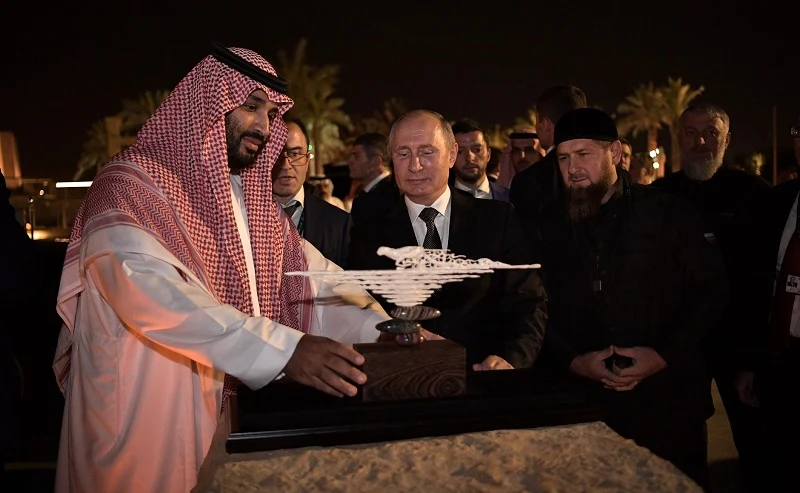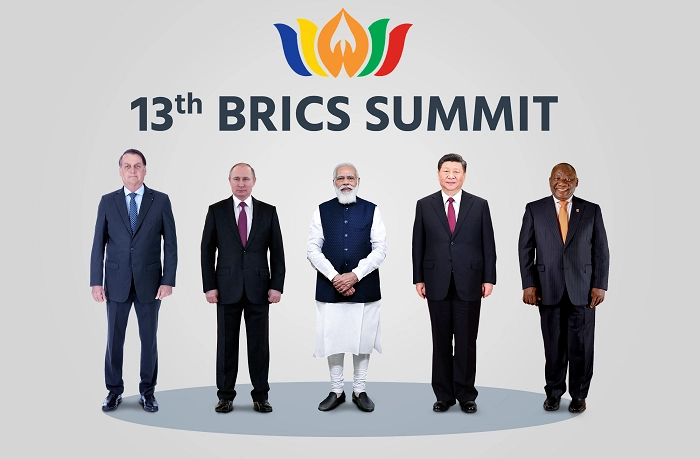

Russian President Vladimir Putin presenting an artefact made of mammoth tusk to Saudi Crown Prince Mohammad bin Salman Al Saud during his state visit to Saudi Arabia in October 2019 (File image courtesy: Kremlin.ru)
When Russian President Vladimir Putin and Saudi Crown Prince Mohammed bin Salman Al Saud spoke over the phone on Friday, they did not just discuss topical bilateral topics and issues such as fixing oil prices in the world market. Also on the agenda was Riyadh’s possible role in the powerful Brazil, Russia, India, China and South Africa (BRICS) grouping.
Stating that the telephone conversation was held at the initiative of the Saudi side, the Kremlin revealed that “prospects for cooperation” between Saudi Arabia and the BRICS association were also discussed between the two leaders.
Over the past few years, there has been a strong demand from emerging market countries to deepen interaction with BRICS which brings together five major emerging economies comprising more than 40 per cent of the world population, 25 per cent of the global economy and more than 18 per cent share in the world trade.
BRICS members have intensified discussions on an expansion process, setting a course for the further development of cooperation between the ‘five’ and interested developing countries in the ‘outreach’ and ‘BRICS Plus’ formats.
Even though the grouping still has to decide regarding the actual launch of the expansion, Saudi Arabia’s growing interest in BRICS is already signalling a major change in the geopolitical architecture of the region.


Iran, another country having major natural gas reserves, has already made its intentions clear on joining BRICS, saying the economic bloc has been able to shape new trends in the world by providing appropriate models and initiatives.
“Conflicting global trends, unilateralism, nationalistic partialities, and challenges such as sanctions and coercive economic action underscore the importance of creating and strengthening new institutions alongside the United Nations, while respecting the sovereignty and national interests of nations, in order to take important steps towards the realization of a society with a common future,” said Iranian President Ebrahim Raisi in a speech at the 2022 summit of the BRICS Business Forum, attended by the group’s top leaders.
South Africa, which currently holds the BRICS presidency and was the last country among the five to join the grouping in 2011, has kept ‘BRICS and Africa: Partnership for Mutually Accelerated Growth, Sustainable Development, and Inclusive Multilateralism’ as the theme of its chairship.
The expansion of BRICS membership is expected to be a major point of discussion during the 15th BRICS Summit that will take place in Durban, later this year.
After returning from a state visit to the Saudi Kingdom last October, South African President Cyril Ramaphosa mentioned Saudi Arabia’s keenness in joining the BRICS group.
“The Crown Prince did express Saudi Arabia’s desire to be part of BRICS… A number of countries are making approaches to BRICS members, and we have given them the same answer, that it will be discussed by the BRICS partners and thereafter a decision will be made,” Ramaphosa was quoted as saying by the local media.
Both Iran and Saudi Arabia could also play a big role in the Shanghai Cooperation Organisation (SCO) – another significant multilateral organisation the presidency of which is currently held by India.
While Iran became a permanent SCO member after the Samarkand Summit last year, Riyadh also decided to join the organisation as a dialogue partner last month.
Established regional leaders, with a huge following among Sunnis and Shias, the presence of the two countries in non-western groupings could majorly impact the balance of power between the emerging and Western economies, with significant geopolitical consequences.
The city of Hamburg in Germany is set to host the 11th edition of India…
The International Atomic Energy Agency (IAEA) has confirmed that two Iranian centrifuge production facilities, TESA…
The human rights department of the Baloch National Movement (BNM), Paank, has strongly condemned the…
In a major boost to India's coastal defence capabilities, the Indian Navy on Wednesday commissioned…
Volker Turk, the UN High Commissioner for Human Rights, on June 17 expressed concern over…
Prime Minister Narendra Modi addressed the G7 Outreach Session on the theme 'Energy Security: diversification,…